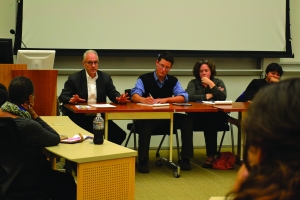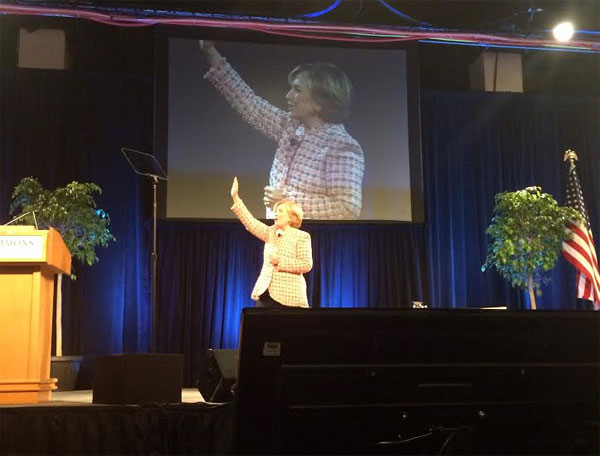By Sarah Kinney
Staff Writer
On Oct. 17, five professors from the economic, political science, and international relations departments explained the causes and effects of the government shutdown and the debt-ceiling crisis, as an agreement was finally reached.
Catherine Paden, professor of political science, opened the discussion with a timeline of events leading up to the shutdown caused by the House and Senate failing to agree to a budget by the beginning of the fiscal year, Oct. 1.
She explained how despite being a minority of the House and having almost no members in high-ranking positions, the Tea Party was able to form a grassroots campaign to derail the government. They also convinced sitting Republicans that they would face competition from Tea Party candidates if they did not aid in stalling the budget.
They had a consistent message of “don’t spend money on Obamacare,” explained Paden.
Obamacare, or the Affordable Care Act, and the budget and debt ceiling are not actually connected otherwise, said economics professor Zinnia Mukherjee. The debt ceiling has been raised more than 90 times in the last 70 years with no major repercussions and basically just limits the amount of money the Treasury can spend to pay interest on debt.
She said how raising government spending is typical because the government can raise more taxes, and as long as personal income grows it is not a major concern. However, in the past few years, income has not gone up while spending has.
The debt ratio was going to be a problem with or without the Affordable Care Act’s passage, she said.
The Affordable Care Act is law and the government shutdown did not affect its start on Oct. 1 when people could apply for insurance online.
International relations professor Ben Cole looks at factionism in countries all over the world. He explained how the Tea Party fits the model for being a faction in the United States.
He was also disappointed in the representation of the back and forth between the parties.
In the question/answer portion, the professors explained that it was portrayed as a negotiation with the Tea Party wanting to defund portions of the Affordable Care Act with the alternative side, presumed to be the Democratic Party, wanting to keep the government open.
“This suggests you are a toddler demanding candy,” said Cole.
Ambassador Mark Bellamy, professor of International Relations, looked at the international repercussions of the government shutdown.
Two thirds of the world uses U.S. dollars as their reserves, explained Bellamy. Other countries cannot imagine a world were the dollar looses value. It order to have a stable global economy, the world must be convinced that the dollar is safe.
“If this happened in any other country, imagine the effect,” said Bellamy, citing that the markets stayed calm in the U.S. but in other countries the stock market would have crashed and there would have been widespread joblessness.
He said that if the U.S. were a third world country, the events of the past few weeks would make us look like an at-risk democracy.
“Our damaged reputation has a lot to do with the things we’ve seen exampled in recent weeks,” said Bellamy.
Claims that women would have solved the problem because they are women aren’t a complete representation, explained political science professor Leanne Doherty. In general, women politicians have more moderate stances, with exceptions such as Michelle Bachman and Elizabeth Warren.
The government shutdown is an example of how a two-party system is probably not ideal, said Doherty.


















